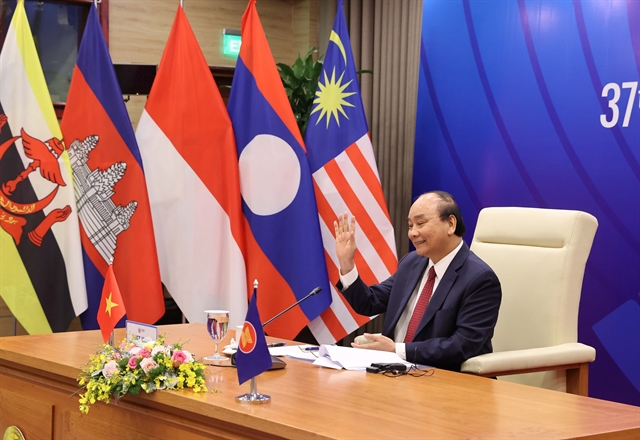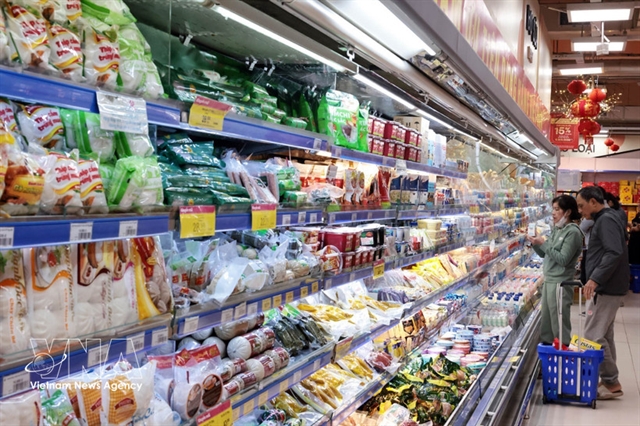 Politics & Law
Politics & Law


|
| Prime Minister Nguyễn Xuân Phúc makes a speech at the plenary session of the 37th ASEAN summit on Thursday. VNA/VNS Photo Thống Nhất |
HÀ NỘI — ASEAN leaders approved the ASEAN Comprehensive Recovery Framework and its implementation plan on Thursday at the plenary session of the 37th ASEAN Summit in Hà Nội.
The plan aims to serve a community exit strategy to recover and build back better from the COVID-19 pandemic.
These measures will help people regain confidence, strengthen competitiveness, and restore supply chains and services which have been disrupted in the medium and long term.
The ASEAN Travel Corridor Arrangement, which will facilitate the safe resumption of essential business travel in the region, was also adopted by leaders on Thursday.
During the meeting, leaders reviewed the co-operation between ASEAN countries. They appreciated Việt Nam's role as the 2020 ASEAN Chair in co-ordinating and leading ASEAN to maintain the momentum of building the three pillars of the community, while promoting co-operation in response to the pandemic and post-pandemic recovery.
The leaders also endorsed the results of the Mid-Term Review of the implementation of the ASEAN Community Master Plan 2025 and issuance of the Hà Nội Declaration on the ASEAN Community Vision post-2025.
The leaders reaffirmed the prerequisite for maintaining solidarity and unity, maintaining ASEAN's central role, enhancing resilience, promoting multilateralism, and upholding the basic principles of the ASEAN Charter and the ASEAN outlook on Indo-Pacific.
ASEAN countries agreed the bloc should continue its efforts to create a favourable environment for dialogue, co-operation and confidence-building efforts, including ensuring effective negotiation of a Code of Conduct (COC) in line with international laws, especially the United Nations Convention on the Law of the Sea (UNCLOS) 1982. They will also continue to support Myanmar to find long-term and sustainable solutions to solve the humanitarian issue in Rakhine State.
Emphasising the importance of completing negotiations for the Regional Comprehensive Economic Partnership (RCEP), the leaders suggested early signing and implementation of the agreement, contributing to the multilateral trade system in a fair manner.
Addressing the meeting, Prime Minister Nguyễn Xuân Phúc said ASEAN should focus its resources on fully implementing the goals of the ASEAN Community Vision 2025, creating new motivation to enhance ASEAN competitiveness in the post-COVID-19 period.
It was essential to exploit opportunities for intra-regional cooperation, apply advanced science and technology, and develop high-quality human resources to establish ASEAN's new position in the global production and supply chain.
In response to challenges posed by natural disasters and diseases, as well as to maintain sustainable development goals, the PM said ASEAN countries should narrow the development gap and enhance connectivity so that no region was left behind.
Regarding measures to maintain peace and stability in the region, the PM said ASEAN should continue to promote its central role in dialogue, co-operation and confidence building in the region.
He reiterated Việt Nam’s view and the common stance of ASEAN to turn the South China Sea (called the East Sea in Việt Nam) into a sea of peace, stability and security where the rule of law was respected.
We must use UNCLOS 1982 as the framework for all activities at sea, taking no action to complicate the situation, he said.
The PM said all disputes should be settled peacefully based on international laws.
It was necessary to strictly and fully implement the Declaration on the Conduct of Parties in the South China Sea and build an effective COC in accordance with international laws and UNCLOS 1982.
Malaysia is firm with its stand that matters relating to the South China Sea must be resolved peacefully and constructively, Prime Minister Tan Sri Muhyiddin Yassin said on Thursday, Bernama news agency reported.
He said it must be resolved in accordance with the universally recognised principles of international law, including the United Nations Convention for the Law of the Sea (UNCLOS) 1982.
"As a coastal state, it is a matter of great significance that our maritime area is safe for international trade to prosper,” he said during the plenary session.
Muhyiddin said ASEAN will remain a strategic player as a bloc in the ever-changing geopolitical landscape, which can only be achieved when all member states continue to communicate and work as a united bloc.
"The reality is that as small nations, we must coalesce with those who share similar values that would be able to defend and promote ASEAN Centrality, the region’s interest and with external parties," he said.
ASEAN Travel Corridor Agreement
In Jakarta, Indonesian President Joko Widodo (Jokowi) welcomed the issuance of the ASEAN Declaration on an ASEAN Travel Corridor Arrangement (TCA) Framework at the 37th ASEAN Summit held via videoconference.
President Jokowi earlier proposed the TCA at the 36th ASEAN Summit on June 26, 2020.
"I warmly welcome that at this summit, we will issue an ASEAN Declaration on an ASEAN Travel Corridor Arrangement Framework. To this end, the plan to implement the ASEAN TCA must be realised immediately," President Jokowi was quoted by Antara news agency as saying.
The head of state highlighted the importance of the ASEAN immediately realising the establishment of temporary fast lanes and health protocols on departures and arrivals, use of integrated digital platforms in the region, determination of the port of entry, as well as provisions of strict health protocols.
President Jokowi also aired optimism over the signing of the Regional Comprehensive Economic Partnership (RCEP) after ASEAN countries negotiated for around eight years.
Public health cooperation
Prime Minister Prayut Chan-o-cha highlighted four key elements to tackling the COVID-19 pandemic while delivering his statement at the plenary session, according to Thai Ministry of Foreign Affairs.
First, ASEAN should strengthen public health cooperation, especially on vaccine security and self-reliance, and making COVID-19 vaccines “global public goods” that are equitably accessible to all. He expressed Thailand’s support on the setting-up of the ASEAN Regional Reserve of Medical Supplies (RRMS) for Public Health Emergencies and committed to make initial contribution of ready to contribute personal protective equipment.
Second, ASEAN should engage in COVID-19 recovery efforts in a holistic manner, particularly through full and effective implementation of the newly established ASEAN Comprehensive Recovery Framework for the benefit of all sectors, especially vulnerable groups and hardest hit sectors such as SMEs to ensure access to funding.
Third, ASEAN should build long-term resilience in facing emerging new challenges by strengthening fundamentals through further regional integration as well as uphold people-oriented and people-centred ASEAN Community which “leaves no one behind”.
Fourth, ASEAN should work together to preserve regional stability in order to create an environment conducive for tackling the COVID-19 pandemic and for economic recovery.
At the end of the meeting, the leaders approved a number of important documents, which proposed by Việt Nam, including the Hà Nội Declaration on the ASEAN Community Vision post- 2025, and the Hà Nội Declaration on Strengthening Social Work towards a Cohesive and Proactive ASEAN Community.
As ASEAN Chair, Prime Minister Phúc announced that the ASEAN Prize 2020 had been presented to the ASEAN Studies Centre under the ISEAS-Yusof Ishak Institute for its contributions to promoting regional co-operation and increasing awareness of the ASEAN Community. — VNS




